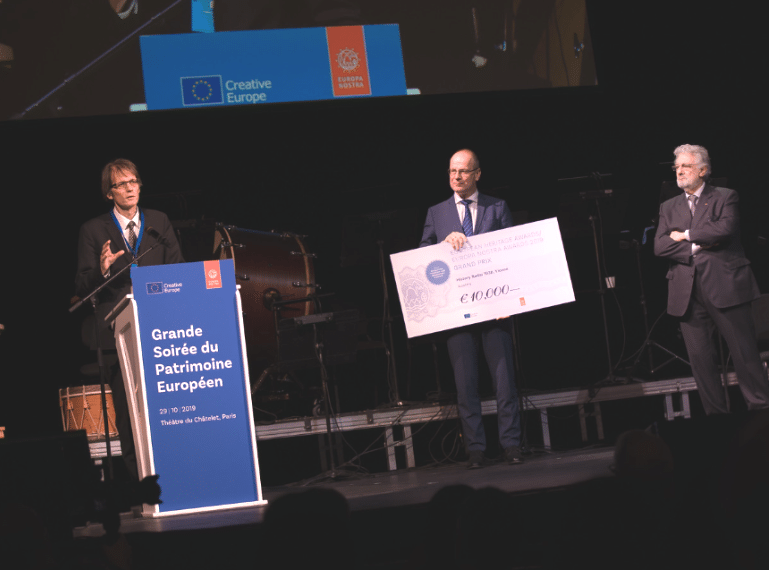
Dr Frederick Baker has won a major EU cultural award for an innovative, large-scale digital project telling the story of the run-up to the 1938 Nazi annexation of Austria, the so-called Anschluss.
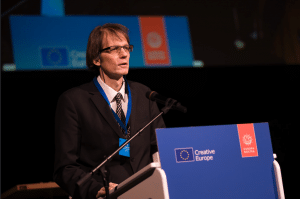 He led a team of filmmakers, historians and programmers involved in the project, which reached thousands of users via the internet, radio, television, and mobile phones, as well as through analogue media such as postcards, lectures, and print. In addition, it was the first digital exhibition on the website of the new Austrian Museum of History in Vienna.
He led a team of filmmakers, historians and programmers involved in the project, which reached thousands of users via the internet, radio, television, and mobile phones, as well as through analogue media such as postcards, lectures, and print. In addition, it was the first digital exhibition on the website of the new Austrian Museum of History in Vienna.
And, in a move of political significance marking the 80th anniversary of the events, the work was projected on to the walls of the current-day Chancellery on the Ballhausplatz in the centre of Vienna in a presentation that included films, photographs and sound recording. During the annexation, this building was the scene of a power struggle between the local Nazis (following orders from Berlin) and the last Austrian President.
“The work is called the History Radar ‘Zeituhr 1938’ and is a web platform describing the key 24 hours in the Nazi invasion of Austria in 1938,” said Fred (OE 1976-1983), who added that the Chancellery was the Austrian “equivalent of Number 10 Downing Street”.
Born in Salzburg but brought up in London, Fred studied Anthropology and Archaeology at St John’s College, Cambridge, Tübingen and Sheffield universities and went on to gain a PhD from Cambridge in 2009. He was a Producer Director for the BBC, working for the corporation from 1994 to 2006. He is the owner of the Austrian film company, Filmbäckerei, and a College Research Association at the Centre for Film and Screen Media, Wolfson College, Cambridge.
 Following the success of the project during the 80th anniversary period last year, it was announced this year that it had won the European Heritage Award/Europa Nostra Award in the Education, Training and Awareness-Raising category. The project was one of only seven to be named as one of the awards’ Grand Prix.
Following the success of the project during the 80th anniversary period last year, it was announced this year that it had won the European Heritage Award/Europa Nostra Award in the Education, Training and Awareness-Raising category. The project was one of only seven to be named as one of the awards’ Grand Prix.
Fred received his award and a cheque for €10,000 from Placido Domingo, President of Europa Nostra, and Tibor Navracsics, European Commissioner for Education, Culture, Youth and Sport, who co-hosted the recent major awards ceremony.
In his acceptance speech, Fred said: “This [project] was 100 per cent Austrian-funded…and I think that says something for the right side of Austria and the correct side of Austria and those who… stood up and are the winners in the end. Thank you very much for this really amazing prize which will help us a lot to carry on and give us support in difficult times.”
In their citation, the awards jury praised the project’s “impressively designed, interactive, web-portal that enhances the user experience and which is especially attractive for young users.
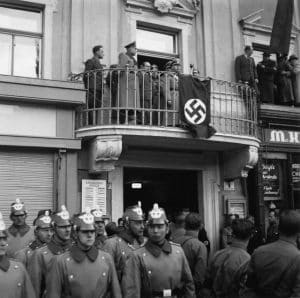 “This project has used innovative media to cast new light on pivotal historical moments in which crucial political decisions were taken. Curiosity was the driving force that provoked this historical storytelling, evoking the collective memory of eyewitnesses. The project’s pioneering technology allows for the constructive mediation of historical events.”
“This project has used innovative media to cast new light on pivotal historical moments in which crucial political decisions were taken. Curiosity was the driving force that provoked this historical storytelling, evoking the collective memory of eyewitnesses. The project’s pioneering technology allows for the constructive mediation of historical events.”
“This innovative approach enables a more nuanced understanding of individual responsibilities in securing democracy and the common values of society. It expresses the dangers of organised propaganda, which, in combination with a compliant media system, can encroach on democratic values and foster unfounded cultural and social bias,” the jury stated.
In a speech at the awards ceremony, Guillaume Poitrinal, President of Fondation du Patrimoine (France’s Heritage Foundation) highlighted the significance of the event: “We all believe here that Europe is not just about economics, Europe is not just about a single currency, Europe is not just about a common market: Europe is also about a common culture.”
The History Radar ‘Zeituhr 1938’ project was produced by Filmbäckerei, in co-operation with Dr Heidemarie Uhl, Dr Michaela Raggam-Blesch, Dr Eva Gressel and Pauli Aro at the Academy of Sciences in Vienna, with digital engineering by Thomas Prieler (Web-Tech) Christoph Kovacs/ Gernot Huber (Sensotix) and design Raimund Schumacher (Lost in the Garden).
Funding came from the Memorial Year 2018 fund of the Austrian Federal Chancellery, the Austrian National Fund of the Victims of Fascism, Austrian Future Funds, City of Vienna Student Research Scholarship funds, the Academy of Sciences and the Haus der Geschichte Österreich.
Fred is the winner of numerous awards – including a previous Europa Nostra Award for work done with Cambridge University – and is renowned for his work as a pioneer of immersive reality. A virtual reality experience based on the work of Austrian artist Gustav Klimt last year proved immensely popular with experts and the public alike. Having first won a Silver Medal for Cinematic Virtual Reality at the European Virtual Reality Halo Awards in Amsterdam, its run at Vienna’s MAK (Museum of Applied Arts) was extended by nearly six months and it was then staged at the Palais des Beaux-Arts (also known as BOZAR) in Brussels.

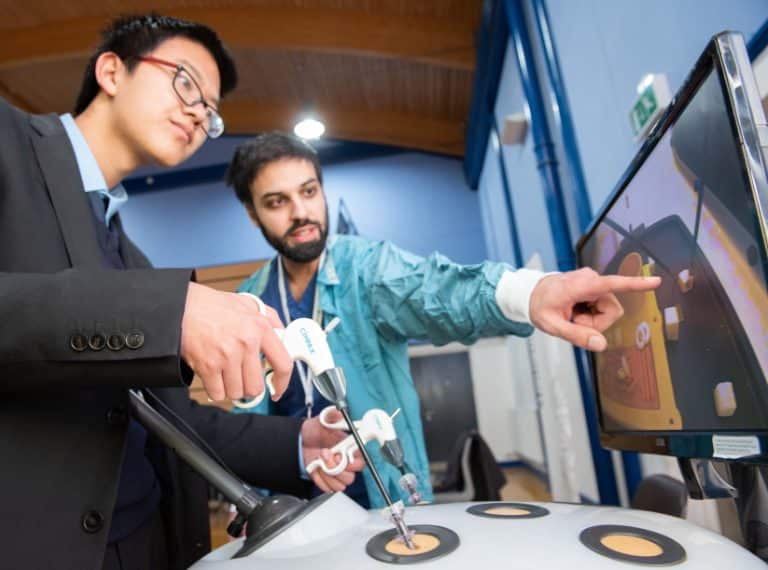
 The convention – a major event in the QE calendar – this year featured an increased number of talks. The speakers for these were among representatives of 35 companies and organisations attending in total, including Old Elizabethans and other visitors.
The convention – a major event in the QE calendar – this year featured an increased number of talks. The speakers for these were among representatives of 35 companies and organisations attending in total, including Old Elizabethans and other visitors.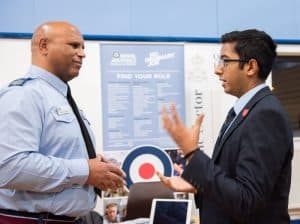 Headmaster Neil Enright said: “It was another tremendous evening. I am grateful to all those who helped our current pupils in this way, whether old boys or other friends of the School. The boys benefit immeasurably from the advice that they receive, not least because seeing alumni thriving in their various careers is in itself a source of inspiration and confidence to them.
Headmaster Neil Enright said: “It was another tremendous evening. I am grateful to all those who helped our current pupils in this way, whether old boys or other friends of the School. The boys benefit immeasurably from the advice that they receive, not least because seeing alumni thriving in their various careers is in itself a source of inspiration and confidence to them.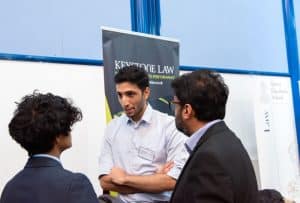 • Dental surgeon Dr Nirmal Wilwaraarachchi (OE 1996-2002) on dentistry
• Dental surgeon Dr Nirmal Wilwaraarachchi (OE 1996-2002) on dentistry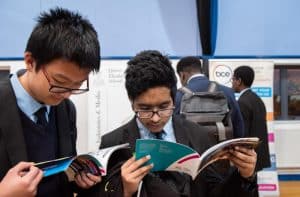 The evening also benefited from experts attending from organisations with which the School has strong partnerships, such as the National Citizen Service (whose summer programme is always popular with Year 11 boys), the STEM Ambassadors programme and the RAF.
The evening also benefited from experts attending from organisations with which the School has strong partnerships, such as the National Citizen Service (whose summer programme is always popular with Year 11 boys), the STEM Ambassadors programme and the RAF.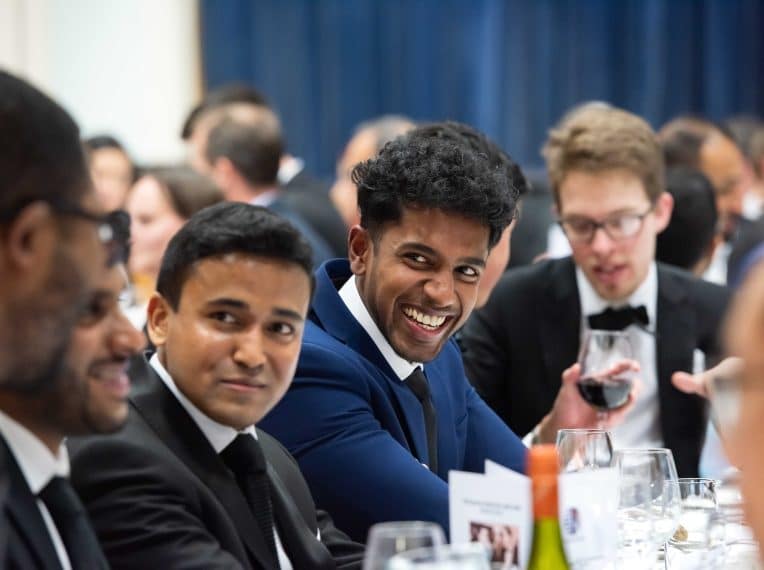
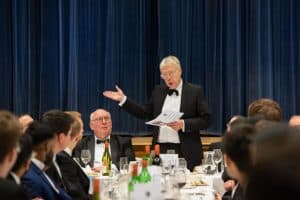 The celebratory tone was amplified by a good attendance from the ‘ten-year leavers’ – the class of 2009–2010 – while older Elizabethans present included Brian Gilbert, returning to the School after a gap of 50 years.
The celebratory tone was amplified by a good attendance from the ‘ten-year leavers’ – the class of 2009–2010 – while older Elizabethans present included Brian Gilbert, returning to the School after a gap of 50 years.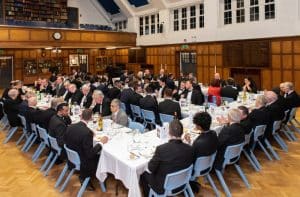 In his speech, Headmaster Neil Enright paid fulsome tribute to Mr Harris (HM 1984–1999): “Few can have had such a profound, transformational and lasting impact on Queen Elizabeth’s as Eamonn Harris, without whom we, quite simply, may well not be sitting here this evening.
In his speech, Headmaster Neil Enright paid fulsome tribute to Mr Harris (HM 1984–1999): “Few can have had such a profound, transformational and lasting impact on Queen Elizabeth’s as Eamonn Harris, without whom we, quite simply, may well not be sitting here this evening.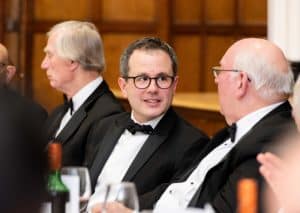 Mr Enright reported on significant developments during the year, including “the exciting news that we have secured £2.2m of government funding…for our new Music School”.
Mr Enright reported on significant developments during the year, including “the exciting news that we have secured £2.2m of government funding…for our new Music School”.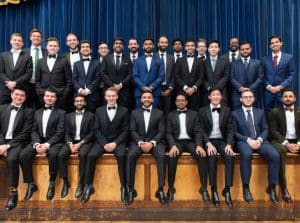 Mr Enright gave a warm, if piquant, welcome to the many ten-year leavers at table, pointing out that Assistant Head David Ryan had described this particular group “as his most challenging in all his years in the Sixth Form”!
Mr Enright gave a warm, if piquant, welcome to the many ten-year leavers at table, pointing out that Assistant Head David Ryan had described this particular group “as his most challenging in all his years in the Sixth Form”!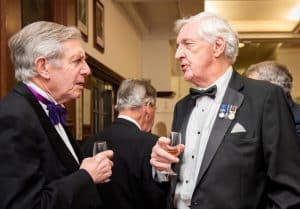 He reported on the start of a project to digitise QE’s archives, beginning with photographs.
He reported on the start of a project to digitise QE’s archives, beginning with photographs.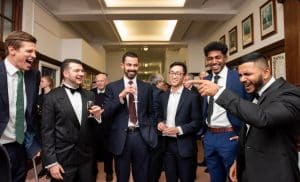 Mr Enright concluded his speech with a report on QE Connect, the School’s recently launched online community for alumni, which has gained more than 450 members in the space of just a few weeks.
Mr Enright concluded his speech with a report on QE Connect, the School’s recently launched online community for alumni, which has gained more than 450 members in the space of just a few weeks.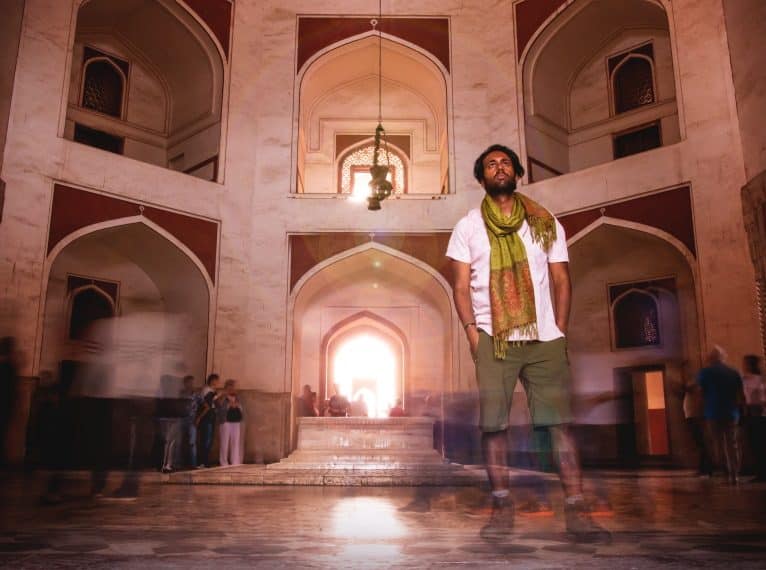
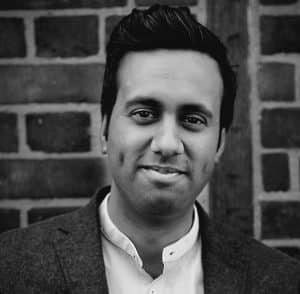 A Chartered Architect who studied Architecture at Nottingham University and then worked in the discipline for more than a decade, he now has a senior role in engineering for Ocado, the grocery company.
A Chartered Architect who studied Architecture at Nottingham University and then worked in the discipline for more than a decade, he now has a senior role in engineering for Ocado, the grocery company.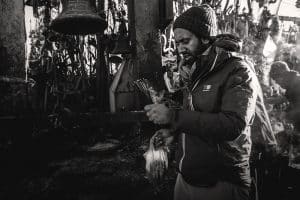 “Outside of my career, before I took this job I had embarked on a solo travelling trip through northern India and Nepal. This had always been a dream of mine, to have such a trip where I could travel in a very simple way – a small bag and my camera. It had been something I put off for a long time as seven years of architectural education took priority, followed by the necessity to earn as soon as I had graduated.
“Outside of my career, before I took this job I had embarked on a solo travelling trip through northern India and Nepal. This had always been a dream of mine, to have such a trip where I could travel in a very simple way – a small bag and my camera. It had been something I put off for a long time as seven years of architectural education took priority, followed by the necessity to earn as soon as I had graduated.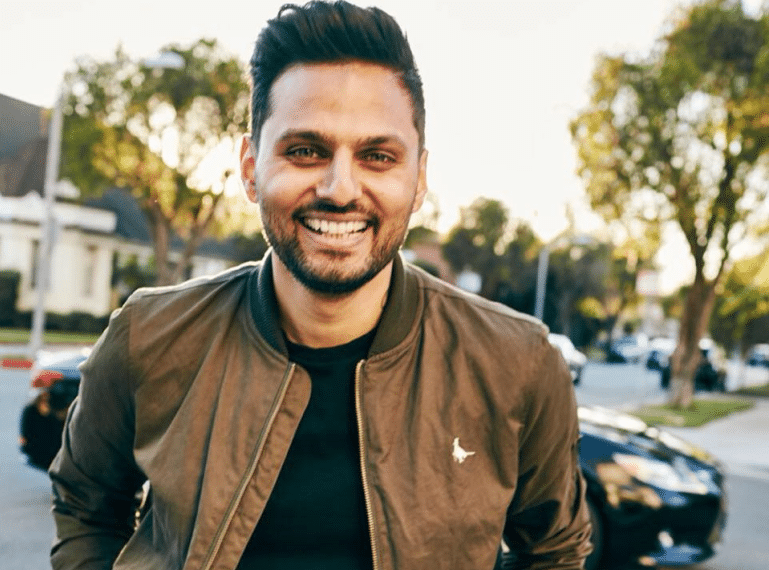
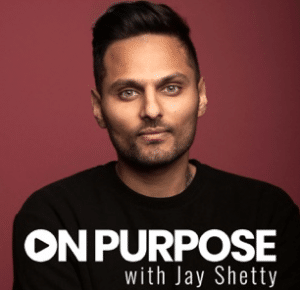 Through his bi-weekly motivational podcast,
Through his bi-weekly motivational podcast, 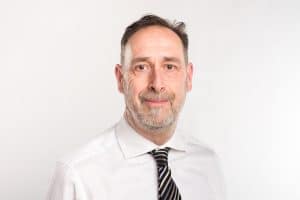 “Mr Buckeridge was one teacher who always stood by me, never judged me. The most important lesson he gave me was every time we did any art – whether it was collage, whether it was graphic, whether it was charcoal, fine art – whatever it was, no matter how good it looked, his question was always ‘Why did you do that?… Why did you put that colour next to that colour? Why did you put that brush stroke versus this one?’ He would always ask me ‘why, why, why, why, why?’
“Mr Buckeridge was one teacher who always stood by me, never judged me. The most important lesson he gave me was every time we did any art – whether it was collage, whether it was graphic, whether it was charcoal, fine art – whatever it was, no matter how good it looked, his question was always ‘Why did you do that?… Why did you put that colour next to that colour? Why did you put that brush stroke versus this one?’ He would always ask me ‘why, why, why, why, why?’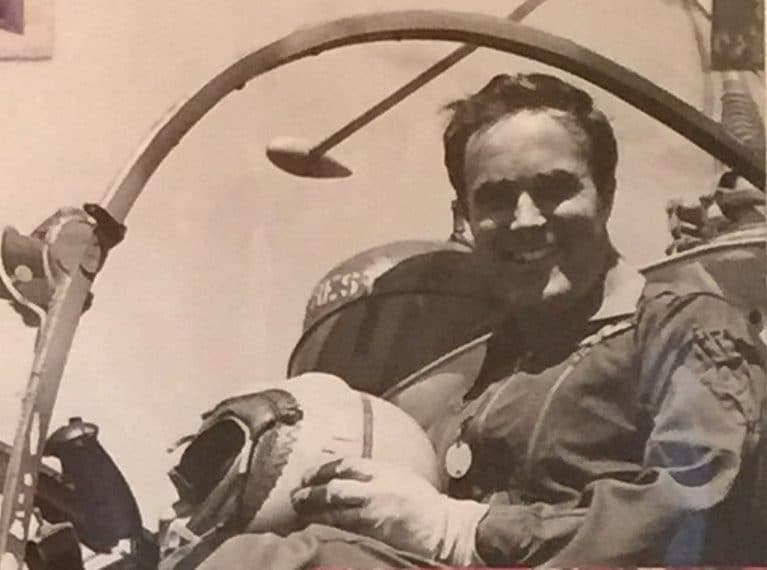
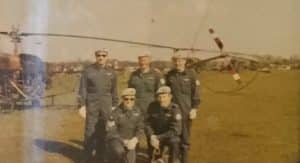 Major Roger Lee Southgate (OE 1958–1963), who died suddenly in April 2016 aged 70, served for 49 years as a soldier and then as a retired officer, spending most of that time in the Army Air Corps (AAC). He won his Air Force Medal (AFM) for an operation in 1974 and is believed to have been the first-ever AAC recipient of the award.
Major Roger Lee Southgate (OE 1958–1963), who died suddenly in April 2016 aged 70, served for 49 years as a soldier and then as a retired officer, spending most of that time in the Army Air Corps (AAC). He won his Air Force Medal (AFM) for an operation in 1974 and is believed to have been the first-ever AAC recipient of the award.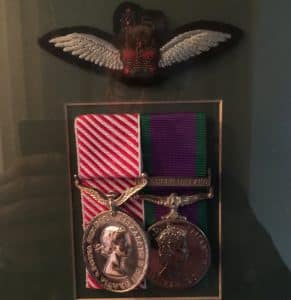 Roger knew of this, and knew, too, that it had been the cause of fatal accidents in the past. “Yet despite the lack of a visible horizon, coupled with a bad weather forecast, Southgate, knowing that a soldier’s life was at stake, agreed to fly the sortie and was accordingly authorised to do so,” the citation stated.
Roger knew of this, and knew, too, that it had been the cause of fatal accidents in the past. “Yet despite the lack of a visible horizon, coupled with a bad weather forecast, Southgate, knowing that a soldier’s life was at stake, agreed to fly the sortie and was accordingly authorised to do so,” the citation stated.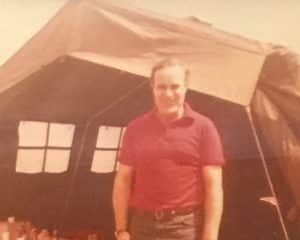 Eventually, with the patrol evacuated from the area, Roger was able to return to base safely, where he had to face the reaction of his superiors. “He was nearly court-martialled for this act of bravery, as he disobeyed orders from his commanding officer to return to base due to horrific weather conditions, being assisted by his navigator, who was only two weeks qualified. The commanding officer said it would either be a court martial or he would be awarded a medal!”
Eventually, with the patrol evacuated from the area, Roger was able to return to base safely, where he had to face the reaction of his superiors. “He was nearly court-martialled for this act of bravery, as he disobeyed orders from his commanding officer to return to base due to horrific weather conditions, being assisted by his navigator, who was only two weeks qualified. The commanding officer said it would either be a court martial or he would be awarded a medal!”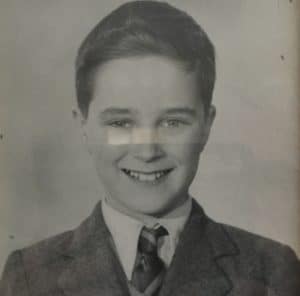 As a boy, Roger lived with his father and mother (Joyce) and sister (Brenda) in a ground-floor council flat at the bottom of Cat Hill, East Barnet. Philip, who spent much of his childhood in Germany, where his father was stationed, remembers holidays spent with his grandparents at this flat, which still stands.
As a boy, Roger lived with his father and mother (Joyce) and sister (Brenda) in a ground-floor council flat at the bottom of Cat Hill, East Barnet. Philip, who spent much of his childhood in Germany, where his father was stationed, remembers holidays spent with his grandparents at this flat, which still stands.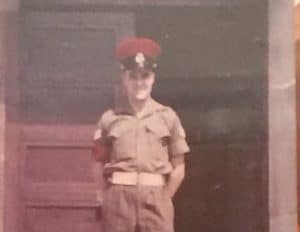 Instead, he joined the Royal Military Police at the age of 16. He started flying training in 1968 and flew in the early years for Strategic Command in England, Denmark and Germany.
Instead, he joined the Royal Military Police at the age of 16. He started flying training in 1968 and flew in the early years for Strategic Command in England, Denmark and Germany.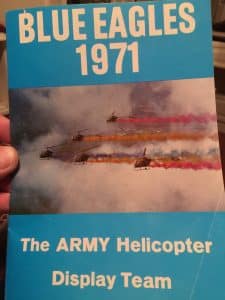 Roger died from a sudden heart attack at the family home in Porton, Wiltshire. In addition to Philip, Roger is survived by Norma, his wife of 47 years, older son Richard, and grandsons Rohahn, aged three, and Lincoln, aged one.
Roger died from a sudden heart attack at the family home in Porton, Wiltshire. In addition to Philip, Roger is survived by Norma, his wife of 47 years, older son Richard, and grandsons Rohahn, aged three, and Lincoln, aged one.